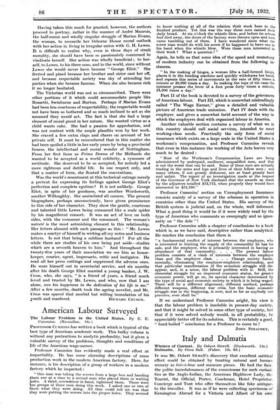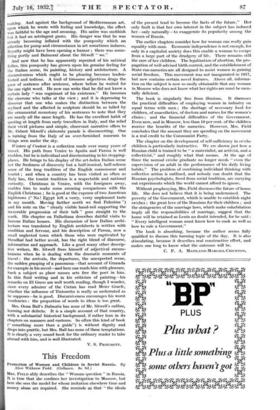Italy and Dalmatia
IT was Mr. Osbert Sitwell's discovery that excellent satirical effect could be obtained by treating natural and human scenery as bric-a-brac and museum pieces. He had the flair, the polite incredulousness of the connoisseur for such curiosi- ties as the Anglo-Indian, .the American Highbrow Lady, th?
Tourist, the Official, Porter, Coachman, Hotel Proprietor, Concierge and Tout who offer themselves like fake antiques to the traveller. It was as if he were collecting specimens.of Kensington Abroad for a Vittoria and Albert of his own making. And against the background of Mediterranean art, upon which he wrote with feeling and knowledge, the effect was faithful to the age and amusing. His satire was snobbish but it had an astringent gusto. His danger was that he was already becoming inflated with the pomposity which an affection for pomp and circumstance in art sometimes induces. Royalty might have been opening a bazaar ; there was some- thing portly and Balmoral about the Sitwell " we."
And now that he has apparently repented of his satirical
follies, this pomposity has grown upon his genuine feeling for the Italian scene, its painting, history and architecture. A discursiveness which ought to be pleasing becomes leaden- footed and tedious. A trail of tiresome adjectives drags the pace of sentence after sentence, where before he waited for the one right word. He now can write that he did not know a certain lady " was cognizant of his existence." He becomes the cicerone who talks at the view ; and it is depressing to discover that one who makes the distinction between the stylized and the affected in sculpture should be so lulled by the ornamental monotony of his sentences to note that they are nearly all the same length. He has the excellent habit of quoting at length from early travellers in Italy, and the relief their vivid pictures and simple, observant narrative offers to Mr. Osbert Sitwell's elaborate parade is disconcerting. One is turning from the Italy of an over-furnished museum to things seen under the sky.
Winters of Content is a collection made over many years of
travel. His path from Venice to Apulia and Parma is well trodden, but he is individual and discriminating in his stopping- places. He brings to his display of the art-laden Italian scene not the freshness of discovery but a half-ironical, half-solemn sense of the long tradition of the English connoisseur and tourist ; and when a country has been visited as often as Italy has, the tourist tradition is a respectable and national curiosity. Christmas in Venice, with the foreigners away, enables him to make some amusing comparisons with the English Christmas ; he is good at the expense of two American highbrows (" No ! Egypt left a verry, verry unpleasant taste in my mouth. Moving farther north we find Palestine ") and his note on the " clearly visible hand-rail supporting the inexorable progression of their talk " goes straight to the mark. His chapter on Palladiana describes dutiful visits to famous Italian houses. His discussion of how Italian archi- tecture was translated by English architects is written with erudition and fervour, and his description of Parma, now a small neglected town which those who were captivated by Stendhal had better avoid, has the right blend of discourse, information and approach. Like a good many other descrip- tive writers, Mr. Sitwell frees himself of adjectival encum- brances when he is dealing with the dramatic moments of travel : the arrivals, the departures, the unexpected scene, the sudden grasping of a panorama—that account of Granada for example in his novel—and here one reads him with pleasure. Such a subject as place names sets free the poet in him. In this fluid writing and in his criticism of painting—his remarks on El Greco are well worth reading, though I wonder, since every admirer of the Cretan has read Meier Graefe, whether the influence of Tintoretto is really as underrated as he supposes—he is good. Discursiveness encourages his worst tendencies : the proportion of words to ideas is too great.
Mrs. Oona Ball's Dalmatia has none of Mr. Sitwell's calibre, learning nor defects. It is a simple account of that country,
with a substantial historical background, if rather lean in its chapters on manners and customs. So often this kind of book (" something more than a guide") is without dignity and drops into prattle, but Mrs. Ball has none of these temptations. It is clearly a very sound book for the ordinary reader to take abroad with him, and is well illustrated.
V. S. PRITCHETT.



































 Previous page
Previous page